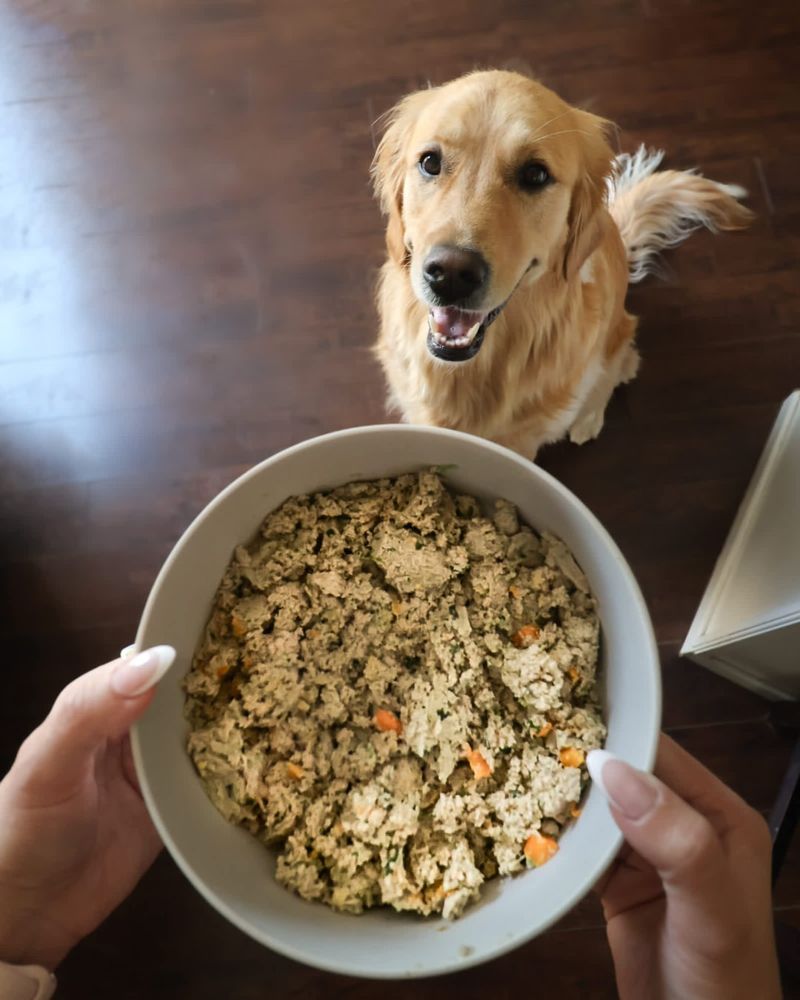Discovering the best foods for your dog’s diet can greatly enhance their health and vitality. These 24 nutritious options are not only delicious but also packed with essential nutrients that support various aspects of canine well-being. From fruits and vegetables to proteins and grains, each item offers unique benefits, ensuring your furry friend gets a balanced diet. Let’s explore these wholesome choices and learn how they contribute to your dog’s overall health.
Blueberries
Blueberries are small, vibrant fruits packed with antioxidants that help combat free radicals, supporting your dog’s immune system. Their rich vitamin C content also contributes to healthy skin and coat, keeping your pet looking shiny and vibrant. These berries are low in calories and high in fiber, making them an excellent treat for dogs needing to maintain a healthy weight. Introducing blueberries in moderation to your dog’s diet can provide a tasty, nutritious boost. You might toss a few into their kibble or offer them as a fresh snack during training sessions.
Carrots
Carrots are crunchy, orange vegetables that serve as a low-calorie, high-fiber snack for your dog. They are rich in beta-carotene, which the body converts into vitamin A, essential for maintaining good vision and a robust immune system. Additionally, the crunchy texture helps clean your dog’s teeth, promoting dental health. Offering raw or cooked carrots as a treat or mixing them into meals can add both flavor and nutrition to your dog’s diet. It’s a simple way to keep those tails wagging and their eyes sparkling.
Pumpkin
Pumpkin is a versatile superfood, loaded with fiber and essential vitamins like A, C, and E, which help regulate digestion and boost the immune system. Its naturally sweet taste is appealing to dogs, making it an easy addition to their meals. Pumpkin is particularly useful in soothing digestive issues, such as constipation or diarrhea, thanks to its soluble fiber content. You can mix pureed pumpkin into your dog’s food or bake it into homemade treats for a nutritious boost. Always ensure it’s plain, without added sugar or spices.
Salmon
Salmon is a protein-rich fish that offers a wealth of omega-3 fatty acids, essential for skin and coat health, joint function, and reducing inflammation. Including salmon in your dog’s diet can lead to a shinier coat and improved cognitive function. This tasty fish is also a great source of lean protein, supporting muscle development and maintenance. Cooking salmon thoroughly and serving it plain is crucial, as raw salmon can contain harmful parasites. Add cooked salmon to your dog’s meals occasionally for a flavorful, healthful treat.
Spinach
Spinach is a leafy green vegetable rich in iron, calcium, and essential vitamins like A, B, C, and K. These nutrients contribute to bone health, energy metabolism, and a strong immune system, keeping your dog healthy and active. Spinach also contains antioxidants that can help reduce inflammation and support overall well-being. It’s best to serve spinach cooked and in moderation, as raw spinach can be difficult for dogs to digest. Mixing a small amount into your dog’s meals can add a nutritious punch to their diet.
Sweet Potatoes
Sweet potatoes are a nutritious root vegetable high in dietary fiber and important vitamins like B6, C, and beta-carotene. These nutrients aid in digestion, boost the immune system, and promote healthy skin and vision. Sweet potatoes have a naturally sweet flavor, making them a delightful addition to your dog’s diet. They can be served cooked and mashed or baked into treats, providing a tasty and healthy alternative to processed snacks. Including sweet potatoes in your dog’s meals supports overall wellness and satisfies their taste buds.
Chicken
Chicken is a lean source of protein, vital for muscle growth and repair in dogs. It’s rich in essential amino acids and provides a great source of energy, supporting daily activity levels. Chicken is also easy to digest, making it suitable for dogs with sensitive stomachs. When preparing chicken for your pet, ensure it’s cooked thoroughly and served plain, without any seasoning or bones. Incorporating chicken into your dog’s diet can help maintain strong muscles and provide the energy needed for play and exercise.
Broccoli
Broccoli is a nutrient-dense vegetable that offers a range of vitamins, including C and K, as well as dietary fiber. These nutrients support immune function, bone health, and improved digestion in dogs. Broccoli also contains antioxidants that may reduce inflammation and protect against certain diseases. Serve broccoli in small quantities, either steamed or raw, to avoid digestive upset. Its crunchy texture can also aid in cleaning your dog’s teeth. Including broccoli in your dog’s meals provides a healthy, low-calorie addition to their diet.
Apples
Apples are a crisp, sweet fruit that makes an excellent treat for dogs. They’re rich in vitamins A and C and provide dietary fiber, which aids in digestion. The natural sweetness of apples appeals to most dogs, making them a popular snack option. Remove the seeds and core before offering, as these can be harmful. Apples can be served raw or blended into homemade treats, adding a fresh and nutritious element to your dog’s diet. Their crunchy texture can also help keep your dog’s teeth clean.
Green Beans
Green beans are low-calorie, high-fiber vegetables that make a healthy snack for dogs. They’re packed with essential vitamins and minerals, including A, C, and K, as well as folic acid and iron. These nutrients support overall health, including bone strength, immunity, and blood health. Green beans can be served steamed, raw, or mixed into your dog’s meals, providing a crunchy and nutritious addition. Their low-calorie content makes them ideal for dogs on a weight management plan, offering a satisfying treat that contributes to a balanced diet.
Eggs
Eggs are a highly digestible protein source, offering essential amino acids and vitamins for your dog’s overall health. They’re rich in B vitamins, selenium, and riboflavin, contributing to energy metabolism and a lush coat. Eggs can also support muscle growth and repair, making them a valuable addition to your dog’s diet. Serve eggs cooked to avoid potential health risks associated with raw eggs. Incorporate them into meals or offer as an occasional treat for a nutritious protein boost. Eggs are a versatile food that can enhance your dog’s wellness.
Peanut Butter
Peanut butter is a tasty treat that most dogs adore, providing healthy fats and protein. It’s an excellent source of vitamins B and E, niacin, and heart-healthy fats, supporting skin and coat health. When choosing peanut butter, ensure it’s free from harmful additives like xylitol, which is toxic to dogs. Use it as a treat or to fill toys, encouraging mental stimulation and play. While peanut butter is calorie-dense, it can be a valuable addition in moderation, offering both nutrition and enjoyment for your pet.
Oats
Oats are a wholesome grain, providing a rich source of dietary fiber, iron, and B vitamins. These nutrients support digestive health, energy metabolism, and overall vitality in dogs. Oats can be particularly beneficial for dogs with sensitive stomachs or allergies, as they’re gentle on the digestive system. Serve oats cooked and plain, without added sugars or flavors. They can be mixed into your dog’s meals or used as a base for homemade treats. Including oats in your dog’s diet contributes to a balanced, nutritious meal plan.
Watermelon
Watermelon is a hydrating fruit, perfect for hot days, rich in vitamins A, B6, and C. It provides a refreshing treat while supporting skin and coat health. Watermelon is low in calories and high in antioxidants, helping combat free radicals and promote overall well-being. Remove seeds and rind before serving to avoid digestive issues. Offer watermelon as a chilled snack or blend it into a fruity puree for a cool treat. This juicy fruit adds a burst of flavor and hydration to your dog’s diet, especially during summer.
Turkey
Turkey is a lean protein source that supports muscle maintenance and energy levels in dogs. It’s rich in essential amino acids and low in fat, making it a suitable option for dogs with dietary restrictions. Turkey provides a flavorful alternative to other proteins like chicken or beef, adding variety to your dog’s meals. Ensure turkey is cooked thoroughly and served plain, without skin, bones, or seasoning. Incorporating turkey into your dog’s diet can help maintain strong muscles and provide essential nutrients for overall health.
Cottage Cheese
Cottage cheese is a dairy product that offers a good source of calcium and protein, beneficial for bone health and muscle maintenance. Its mild flavor and creamy texture appeal to many dogs, making it an easy addition to meals. Cottage cheese is also lower in lactose than other dairy products, making it easier for some dogs to digest. Serve it in moderation, mixed into food or as a standalone snack. Including cottage cheese in your dog’s diet can add a nutritious boost without overwhelming their digestive system.
Bananas
Bananas are a sweet, nutritious fruit offering vitamins and minerals like potassium, vitamin C, and B6. These nutrients support heart health, energy levels, and immune function, making bananas a beneficial treat for dogs. Their natural sweetness and soft texture make them easy to incorporate into snacks or meals. Bananas can be served sliced, mashed, or blended into homemade treats. While they’re high in sugar, offering them in moderation can provide a refreshing, healthy option for your dog. Bananas make for a tasty and energizing addition to the diet.
Cranberries
Cranberries are small, tart fruits rich in antioxidants and vitamins C and E, supporting urinary tract health and reducing inflammation. Including cranberries in your dog’s diet can help combat bacteria and promote overall immune function. These berries are low in calories and can be served fresh, dried, or as a juice, provided it’s free from added sugars. Cranberries offer a unique flavor that can be mixed into meals or homemade treats, adding both nutrition and variety. They are a beneficial and tasty option for your pet.
Brown Rice
Brown rice is a whole grain that provides essential nutrients like fiber, B vitamins, and minerals such as magnesium and selenium. It supports digestive health and provides a steady energy source for active dogs. Brown rice is easily digestible, making it suitable for dogs with sensitive stomachs. Serve it cooked and plain, mixed into meals or as a base for homemade dog food. Incorporating brown rice into your dog’s diet can offer a nutritious, low-fat option that supports overall health and vitality. It is a wholesome addition to any meal.
Zucchini
Zucchini is a versatile vegetable, low in calories and high in vitamins like A, C, and folate. These nutrients support eye health, immunity, and overall well-being in dogs. Zucchini’s crunchy texture makes it a satisfying snack, while its mild flavor blends well with other foods. Serve it raw or cooked in small amounts to avoid digestive upset. Including zucchini in your dog’s diet adds variety and nutrition, contributing to a balanced meal plan. It’s an excellent option for weight management, offering a healthy, low-calorie treat.
Yogurt
Yogurt is a probiotic-rich dairy product that supports digestive health by introducing beneficial bacteria to the gut. It’s a good source of calcium and protein, contributing to strong bones and muscles in dogs. Choose plain, unsweetened yogurt to avoid added sugars and artificial flavors. Yogurt can be mixed into meals or served as a standalone treat, offering a creamy texture that many dogs enjoy. Providing yogurt in moderation can enhance your dog’s diet by promoting gut health and adding essential nutrients.
Kale
Kale is a leafy green vegetable packed with vitamins A, C, and K, as well as calcium and antioxidants. These nutrients contribute to bone health, immune function, and reduced inflammation in dogs. Kale’s rich nutrient profile makes it a valuable addition to your dog’s diet, supporting overall wellness. Serve kale cooked or raw in small amounts, as large quantities can lead to digestive upset. Including kale in your dog’s meals or as a garnish provides a nutritious boost, enhancing their diet with essential vitamins and minerals.
Quinoa
Quinoa is a nutrient-dense grain, rich in protein, fiber, and essential amino acids. It supports muscle development and digestive health while providing sustained energy for active dogs. Quinoa is also gluten-free, making it suitable for dogs with dietary sensitivities. Serve it cooked and plain, mixed into meals or as a base for homemade dog food. Incorporating quinoa into your dog’s diet offers a wholesome, balanced option that contributes to overall health. Its high protein content and digestibility make it a valuable addition for maintaining your dog’s vitality.
Pineapple
Pineapple is a tropical fruit rich in vitamins C and B1, as well as manganese and bromelain, an enzyme that aids digestion. These nutrients support immune function, bone health, and reduce inflammation in dogs. Pineapple’s sweet taste and juicy texture make it an appealing snack, especially on warm days. Remove the tough core and skin before serving to avoid digestive issues. Pineapple can be offered fresh or blended into treats, providing a refreshing, healthy addition to your dog’s diet. Its unique flavor and nutritional benefits make it a delightful option.
























